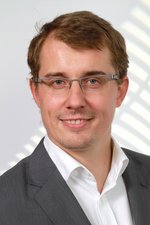<br> In the sense of quality assurance, it is planned that findings and materials are made available to colleagues and especially to lecturers. In this context, the preparation of the materials and the scientific validation of the teaching concepts exceeds the effort of the otherwise usual cooperation to a particular extent. The concept being developed in the pilot project for the module "Higher Mathematics" in the courses of study Civil Engineering and Industrial Engineering can in all probability be extended well to other areas, so that as a perspective, the concept can be extended to other courses of study and service offers could be made available for other colleagues.
Learning and teaching concept
In the first step, an innovative teaching-learning concept for the module "Higher Mathematics 1+2" in the Civil Engineering and Industrial Engineering and Management course is being developed within the laboratory. The method is an adaptation of the Inverted Classroom and provides an integrated learning scenario consisting of e-learning and classical elements, which is specially tailored to the requirements of a HAW. Here, the different needs of the students - with their very heterogeneous entry requirements - are to be specifically addressed. This is achieved by combining optional and mandatory offers with individualised feedback. To this end, the online self-assessment services will be expanded, among other things. The aim is for students to take greater personal responsibility for their learning success. The lecturer changes from the role of a material mediator to that of a learning guide. This is to be achieved by breaking down the content to be taught into smaller units (so-called work packages), which the students have to complete in given periods of time. The students are provided with various resources in the form of instructional videos, electronic self-assessment tests and differentiated exercises. The self-learning material is supplemented by exercises based on the HAITI model and classic lecture units. By increasing the self-control of the learning process the intrinsic motivation should be increased and space for individual feedback should be gained. As the concept is still new, we assume that further improvements will have to be made during the process. As soon as the concept works well, the next step will be to standardize and modularize the concept so that the finished teaching-learning concept can be adopted by other lecturers in the lectures of the module "Higher Mathematics 1 and 2" in the BB and WBI programs, and at the same time there is the freedom to adapt the concept to the individual teacher. In the next step, the concept can then be extended to other lectures.
Research
Another important aspect of the "Mathematics Didactics" laboratory is to scientifically examine the developed concepts and thus ensure the quality gain for teaching. To this end, both qualitative and quantitative studies will be conducted to investigate both short-term and long-term changes in students' learning behaviour. As a result, new impulses for mathematics didactics in general and engineering mathematics didactics in particular are to be given within the framework of publications.
Resourcen
In the project "Effective Studying 2" from the Teaching Quality Pact, about 1.5 assistant positions will be available by the end of 2020. This equipment is sufficient to cover the personnel requirements of the laboratory. The need for material resources is low and should be covered by the standard equipment and the already existing infrastructure for e-learning offers.
![[Image: shutterstock 2474543597 Hero Images on Offset] bachelor studierende angewandte mathematik und künstliche intelligenz freuen sich. bild shutterstock 247454359 hero images on off set](/fileadmin/Dateien/Mathematik/_processed_/b/b/csm_shutterstock_2474543597_d63d3f1ee7.jpg)
![[Image: HFT Stuttgart] Ein Mathematike im Labor](/fileadmin/Dateien/Mathematik/Bachelor-Mathematik/Labore/Mathematik-Labor-Didaktik-Bei-Aufzeichnung.jpg)
